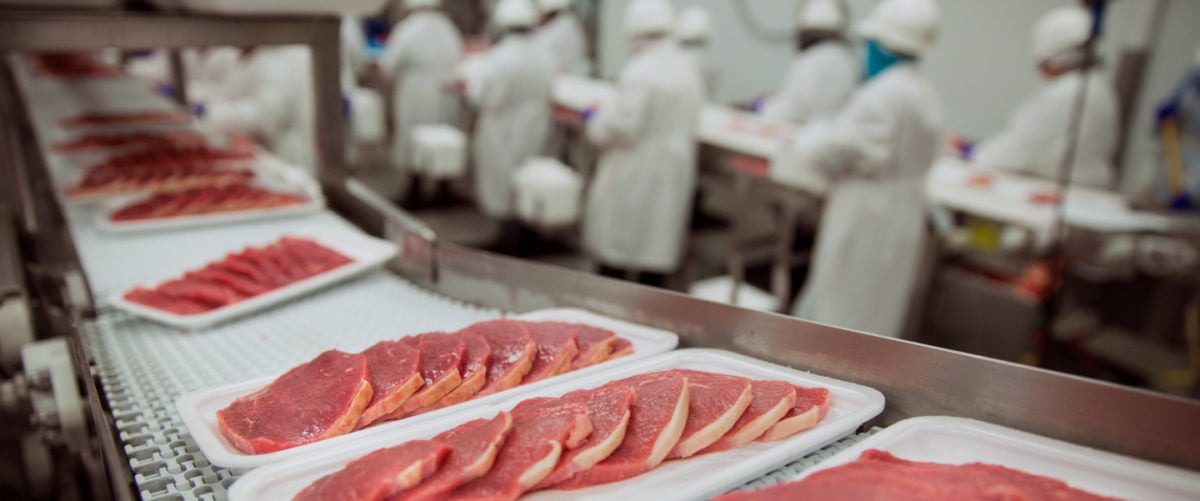Our Smithfield Lawsuit Exposes Lies About Meat Shortages and Worker Safety
Published Jun 21, 2021

During the pandemic, Smithfield claimed we were “perilously close to the edge in terms of our meat supply” and that their first priority was keeping workers safe. Both are lies.
Of all the dark truths the pandemic has exposed about our society and food system, meatpacking companies’ greed and shocking disregard for workers’ safety makes our blood boil the most. And one corporation in particular has repeatedly and egregiously lied to the public throughout the crisis to protect its bottom line. That corporation is Smithfield Foods.
Food & Water Watch Sues Smithfield for Misleading Claims
At the height of the pandemic, slaughterhouses became ground zero for massive COVID-19 outbreaks. Thousands of meatpacking workers across the country contracted the virus. In some cases, the outbreaks even forced plants to temporarily shut down.
This crisis exposed the vulnerability of a food system controlled by a few powerful and highly consolidated corporations. What’s more, it accelerated nationwide transmission of the virus.
Enough is enough.
Last week, Food & Water Watch brought suit against Smithfield on behalf of the general public. We’re alleging that the company has violated the District of Columbia’s consumer protection law, which prohibits corporate bad actors from lying to consumers for profit. Our Executive Director Wenonah Hauter explains why we’ve brought the suit:
“Corporations like Smithfield routinely choose profit over people. The company utterly failed to protect its workers as the coronavirus spread like wildfire throughout its meat processing facilities, and its fear mongering about meat shortages was designed to exploit consumer panic and boost sales. Smithfield put workers’ lives at risk all in the name of corporate greed and turned already notoriously dangerous workplaces into deadly ones.”
Smithfield’s False Advertising Campaign Duped Consumers
Our complaint lists in detail the numerous and specific false claims Smithfield has peddled about its pandemic response. Here’s a summary of what our lawsuit alleges:
Throughout the COVID-19 pandemic, Smithfield has mounted a distinctly aggressive public relations campaign geared toward leveraging the pandemic to increase its profits. Through advertisements, social media statements, and website representations, Smithfield has adopted a two-step press offensive to mislead consumers and salvage its image — and its bottom line.
First, Smithfield has misrepresented to consumers that a countrywide meat shortage was imminent. This fear-mongering was designed to create a revenue-generating feedback loop. It aimed to stoke and exploit panic, and in turn cause demand for Smithfield’s meat products to surge.
Second, Smithfield has misrepresented working conditions in its plants to allay consumer concerns for worker safety. Line-level meatpacking workers, in part due to false fears of a meat shortage, have been required to work in-person throughout the pandemic — often in cramped conditions on crowded production lines.
Smithfield has repeatedly assured consumers through advertisements and a comprehensive social media campaign that the company is keeping its workers safe. Indeed, the company has prominently featured workplace safety in its marketing and branding efforts during the pandemic.
Here are two facts that are important to understand so that Smithfield is held accountable:
FACT: OUR MEAT SUPPLY WAS NEVER IN DANGER
Smithfield’s messaging could not be further from the truth. To stoke fears of a meat shortage, Smithfield warned American consumers in April 2020 that the nation was “perilously close to the edge in terms of our meat supply.”
But at the same time, Smithfield’s foreign exports were surging. Multiple studies show the company’s pork exports to China hit record highs that same month.
Government data further refute Smithfield’s doom-and-gloom warnings, showing that pork inventory held in “cold storage” warehouses was well into the hundreds of millions of pounds. In fact, analysts estimate this store could have kept grocery stores stocked with pork for months, even without additional production.
FACT: THE LIVES OF SMITHFIELD WORKERS WERE AT RISK
Smithfield’s reassurances on workplace safety were equally deceptive. On this score, its track record speaks for itself, as company slaughterhouses repeatedly emerged as epicenters for COVID-19 outbreaks.
Moreover, Smithfield depicted specific workplace safety protocols in detailed photographs, videos, and promotional copy amplified through its website and social media accounts. But these representations are consistently refuted by safety citations issued by government regulators and the accounts of actual Smithfield workers.
In all, Smithfield chose to leverage the pandemic to its advantage. Its PR team loudly beat the drum on issues of enormous significance. It exploited consumers’ fears about meat shortages and deceptively calmed their concerns about workplace safety.
And while the company’s campaign on these fronts has no doubt protected profits, this campaign is built on a series of egregious misrepresentations and falsehoods.
What Happens if We Win?
If the court agrees that Smithfield violated D.C.’s consumer protection law, it could not only order Smithfield to publicly retract its lies, but also pay a penalty for its deceit.
Help our attorneys make Smithfield pay for its pandemic falsehoods.
Enjoyed this article?
Sign up for updates.
TO TOP


